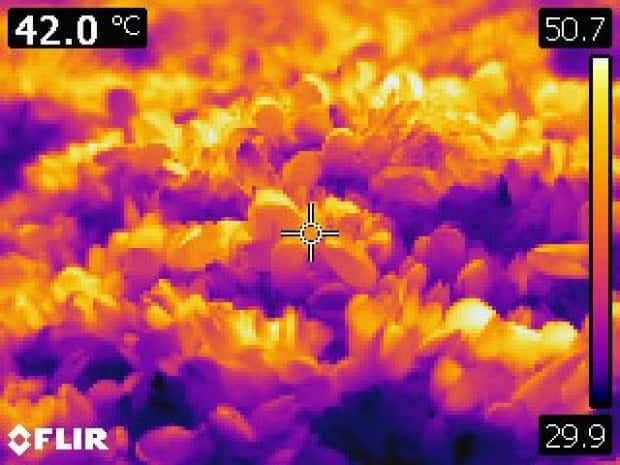More than a billion seashore animals may have cooked to death in B.C. heat wave, says UBC researcher

Chris Harley walked onto Vancouver's Kitsilano Beach in late June and smelled death.
Carpeting the sea rocks were tens of thousands of mussels, clams, sea stars and snails, emitting a putrid odour that hung thick in the heat.
"I was pretty stunned," he said.
Harley, a marine biologist at the University of British Columbia, now estimates that last week's record-breaking heat wave in B.C. may have killed more than one billion seashore animals living along the Salish Sea coastline.
The findings shine a light on the seismic effects of the heat wave, which has already been linked to hundreds of human deaths as the ecological toll continues to unravel.
As temperatures cracked 40 C in Vancouver, and several degrees higher in B.C.'s Interior, infrared cameras used by Harley's team recorded temperatures above 50 C on rocky shoreline habitats.

Intertidal animals such as mussels, which live where land and sea meet, can endure temperatures in the high 30s for short periods of time, Harley said.
But the scorching heat, combined with low tides in the middle of the afternoon, created a dangerous combination for more than six hours at a time.
"A mussel on the shore in some ways is like a toddler left in a car on a hot day," Harley said.
"They are stuck there until the parent comes back, or in this case, the tide comes back in, and there's very little they can do. They're at the mercy of the environment. And on Saturday, Sunday, Monday, during the heat wave, it just got so hot that the mussels, there was nothing they could do."
Water quality will be impacted
Tipped off by the smell on the Sunday morning of the heat wave, Harley and a team of student researchers began to canvas multiple coastlines, including those in West Vancouver and on the Sunshine Coast.
They discovered endless rows of mussels with dead meat attached inside the shell, along with other dead creatures, including sea stars and barnacles.
Harley calculated the number of dead animals found in small areas and multiplied it by the habitat size in the Salish Sea, which spans from Campbell River, B.C., to Olympia, Wash.
"You can fit about 2,000 mussels in an area the size of your stovetop," he said.
"Imagine how many stovetops you could fit into Stanley Park, and then how many Stanley Parks fit into the Salish Sea. So if you're losing a few hundred or a few thousand mussels for every major shoreline, that quickly scales up to a very, very large number."

The wipeout will temporarily affect water quality, as mussels and clams help filter the sea, Harley said.
While the mussel bed will likely recover in a year or two, Harley noted that heat waves will happen more frequently and with greater severity due to climate change.
"Eventually, we just won't be able to sustain these populations of filter feeders on the shoreline to be anywhere near the extent that we're used to," he said.
Fisheries and Oceans Canada, which oversees marine conservation, did not provide a spokesperson for comment.
'Very disheartening'
Chris Neufeld, a research scientist for the Bamfield Marine Sciences Centre on Vancouver Island, said he wasn't surprised by Harley's findings.
"It was very disheartening to realize we're actually in this moment that we've been predicting for a long time," he said.
Neufeld said B.C. has about 60,000 kilometres of linear shoreline, a distance spanning Victoria to Halifax nine times. Much of the shores are remote and hard to access, making it tough to gauge the full scope of the heat wave's damage.
"Certainly the scale of this on a coastline scale could be much larger," he said. "But we just don't have the data yet to know."
The impacts could also extend into the ocean, where the water temperature in the region jumped by 3 C, Neufeld warned.
Marine foundation species, such as coral reefs, kelp beds and seagrass meadows, depend on cooler temperatures to survive. Researchers will deploy sensors in sea habitats around Vancouver Island this summer to document the heat wave's effects, Neufeld said.
Harley said similar discoveries of dead shellfish have already been made in the Strait of Georgia and Washington state. He plans to visit the Gulf Islands and Vancouver Island to confirm seashore deaths in those areas, with the aim of publishing a peer-reviewed paper as early as next year.
The deaths, he said, are a reminder that the environment is suffering severe consequences from extreme weather events.
"If we don't like it, then we need to work harder to reduce emissions and take other measures to reduce the effects of climate change."

